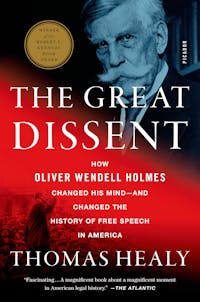The Great Dissent
How Oliver Wendell Holmes Changed His Mind--and Changed the History of Free Speech in America
 Download image
Download image
ISBN10: 1250058694
ISBN13: 9781250058690
Trade Paperback
352 Pages
$24.00
CA$32.50
No right seems more fundamental to American public life than freedom of speech. Yet well into the twentieth century, that freedom was still an unfulfilled promise, with Americans regularly imprisoned merely for speaking out against government policies. Indeed, free speech as we know it comes less from the First Amendment than from a most unexpected source: Supreme Court justice Oliver Wendell Holmes. A lifelong skeptic, he disdained all individual rights, including the right to express one's political views. But in 1919, it was Holmes who wrote a dissenting opinion that would become the canonical affirmation of free speech in the United States.
Why did Holmes change his mind? That question has puzzled historians for almost a century. Now, with the aid of newly discovered letters and confidential memos, law professor Thomas Healy reconstructs in vivid detail Holmes's journey from free-speech opponent to First Amendment hero. It is the story of a remarkable behind-the-scenes campaign by a group of progressives to bring a legal icon around to their way of thinking—and a deeply touching human narrative of an old man saved from loneliness and despair by a few unlikely young friends.
Beautifully written and exhaustively researched, The Great Dissent is intellectual history at its best, revealing how free debate can alter the life of a man and the legal landscape of an entire nation.
Reviews
Praise for The Great Dissent
"Riveting... Healy's informative and readable account deserves an honored place in the intellectual history of the Supreme Court."—The New York Times Book Review
"Fascinating . . . A magnificent book about a magnificent moment in American legal history."—The Atlantic
"Eye-opening . . . A stirring mix of intelligent biography and truly significant social and legal history."—The Christian Science Monitor
"Engrossing . . . An exceptional account of the development of the Constitution's most basic right, and an illuminating story of remarkable friendships, scholarly communication, and the justice who actually changed his mind."—Kirkus Reviews (starred review)
"Healy masterfully depicts the transition from Holmes's limited view of First Amendment protections to an expansive, eloquent, and precedent-setting interpretation . . . Along with clear explanations of the legal theories at play, the author provides context to Holmes's decision with informative descriptions of the historical events of the time and insightful forays into Holmes personal psychology. This is a fascinating look at how minds change, and how the world can change in turn."—Publishers Weekly
"A beautifully written history, capturing the lively and passionate debate as Holmes came to see the abiding imperative of free speech."—Booklist
"This is the most exciting and illuminating book on the history of the American free speech tradition I have ever read. Thomas Healy's masterful account is a thrilling combination of intellectual detective work, gripping narrative, and psychological biography. If you're looking for a page-turner of constitutional history, this is the book to read: with unforgettable detail, it shows how the crowning achievement of American liberty—the principle that speech can't be banned unless it threatens imminent violence—actually emerged from Holmes's nimble mind, skeptical temperament, broad reading, and concern for his embattled friends."—Jeffrey Rosen, author of The Supreme Court: The Personalities and Rivalries That Defined America
"This is a gem of a book, part intellectual detective story, part judicial biography, and all composed with a flair that makes it a pleasure to read. The revelation—it is nothing less than that—of how Justice Holmes came to write the greatest First Amendment opinion in American history is worth the attention and admiration of all."—Floyd Abrams, author of Friend of the Court: On the Front Lines with the First Amendment
"Lively and engaging . . . The Great Dissent takes us back to the time when a collection of great men—including Learned Hand, Felix Frankfurter, Ernst Freund, Harold Laski, and Louis Brandeis—nagged, cajoled, and eventually enlightened Oliver Wendell Holmes into writing the most eloquent and most important free speech opinion in American history."—Geoffrey R. Stone, author of Perilous Times: Free Speech in Wartime from the Sedition Act of 1798 to the War on Terrorism
"The Great Dissent is that rare book that combines first-rate scholarship with brilliant storytelling. Bursting with intimate details and colorful characters, it brings to life the ideas underlying our First Amendment tradition. Free speech, it reminds us, does not come from the Constitution alone, but from passionate personal struggles."—Nadine Strossen, former president of the American Civil Liberties Union and author of Defending Pornography: Free Speech, Sex, and the Fight for Women's Rights
Reviews from Goodreads
BOOK EXCERPTS
Read an Excerpt
Prologue
An Unexpected Visit
On Friday, November 7, 1919, as federal agents launched a nationwide raid on the homes and meeting halls of Russian immigrants, three members of the United States Supreme Court mounted the steps of a...
MEDIA
Watch
Thomas Healy interviewed on The Leonard Lopate Show
Thomas Healy discusses 'The Great Dissent: How Oliver Wendell Holmes Changed His Mind--and Changed the History of Free Speech in America" on The Leonard Lopate Show.
Share This


